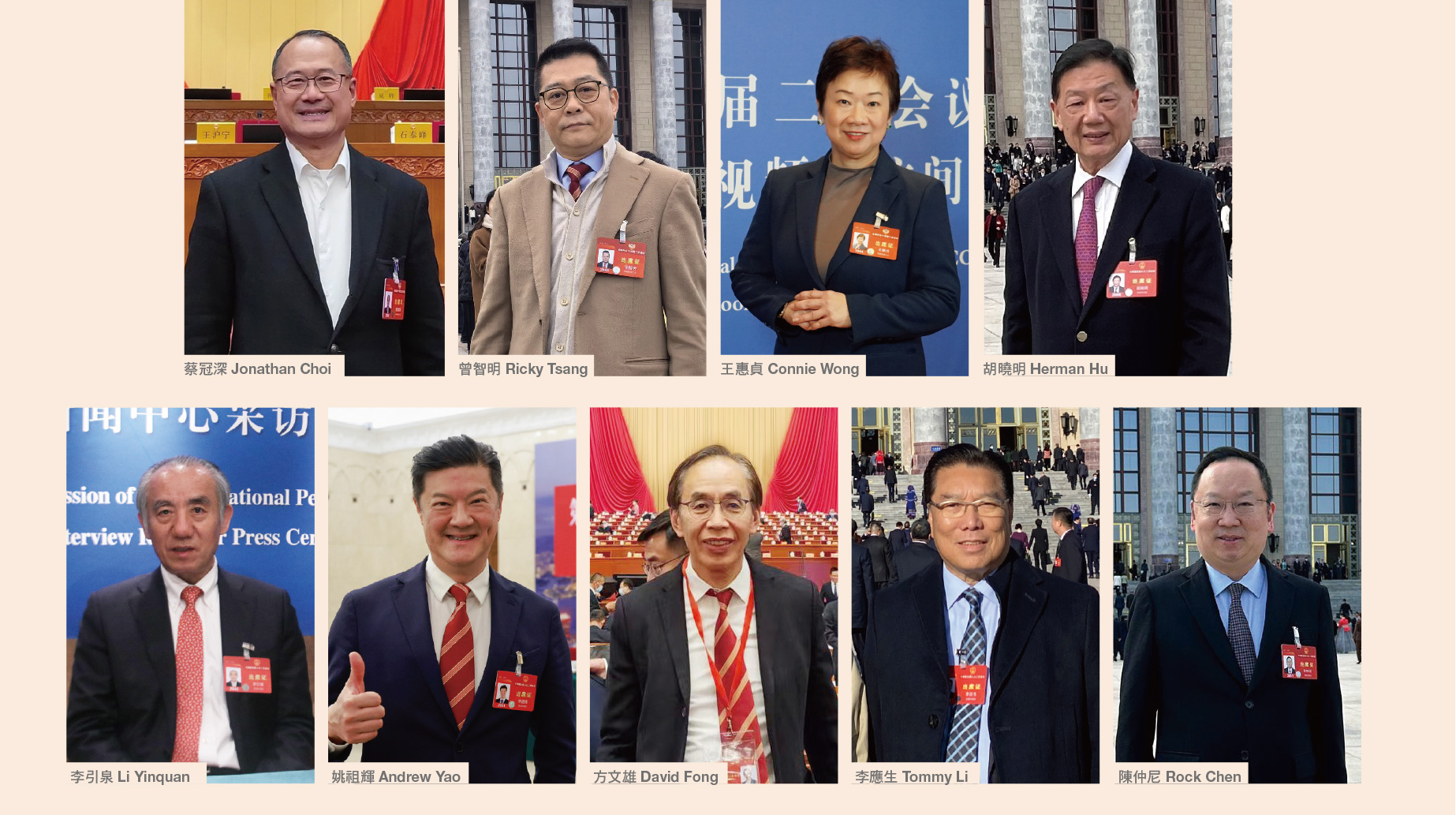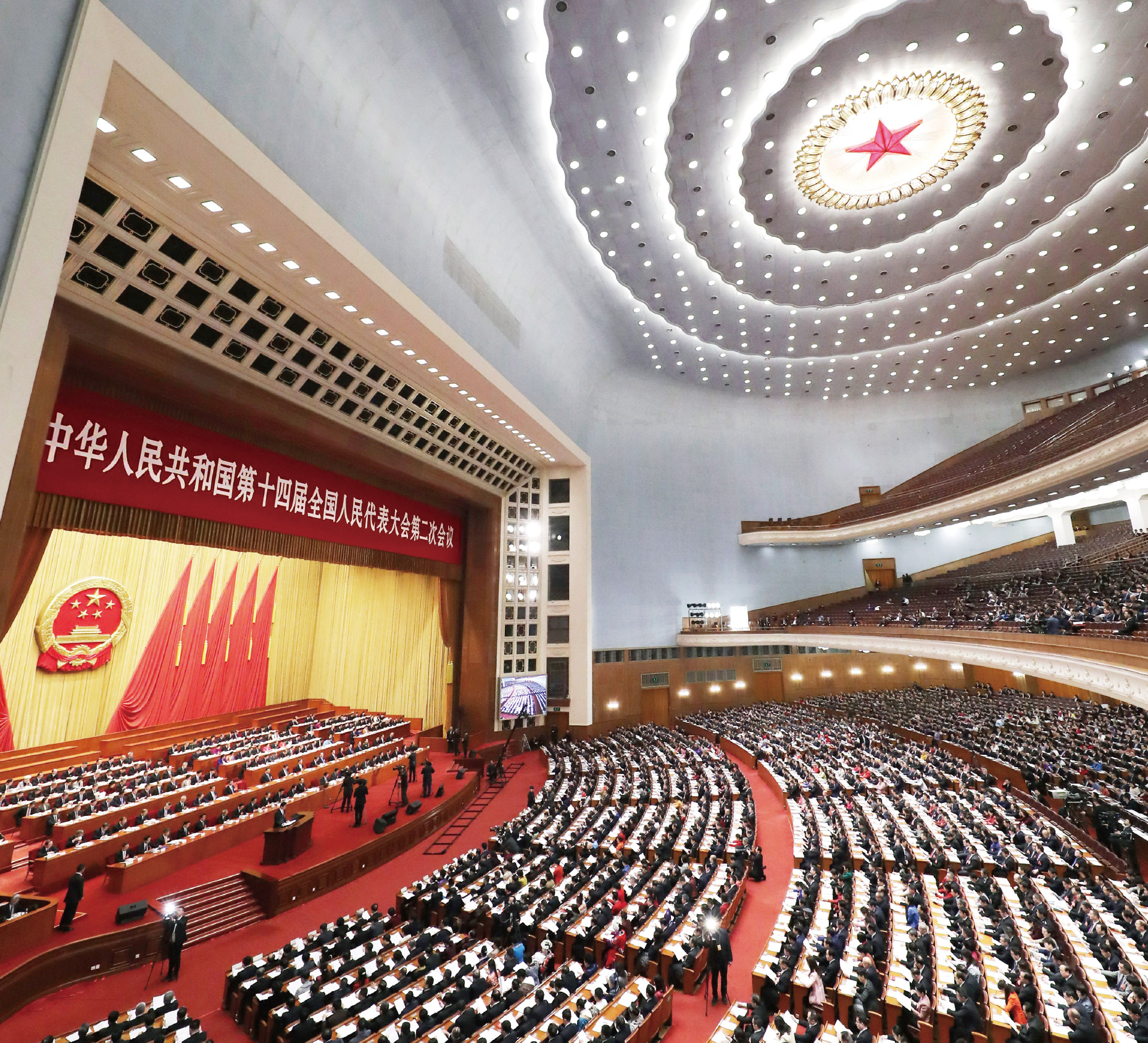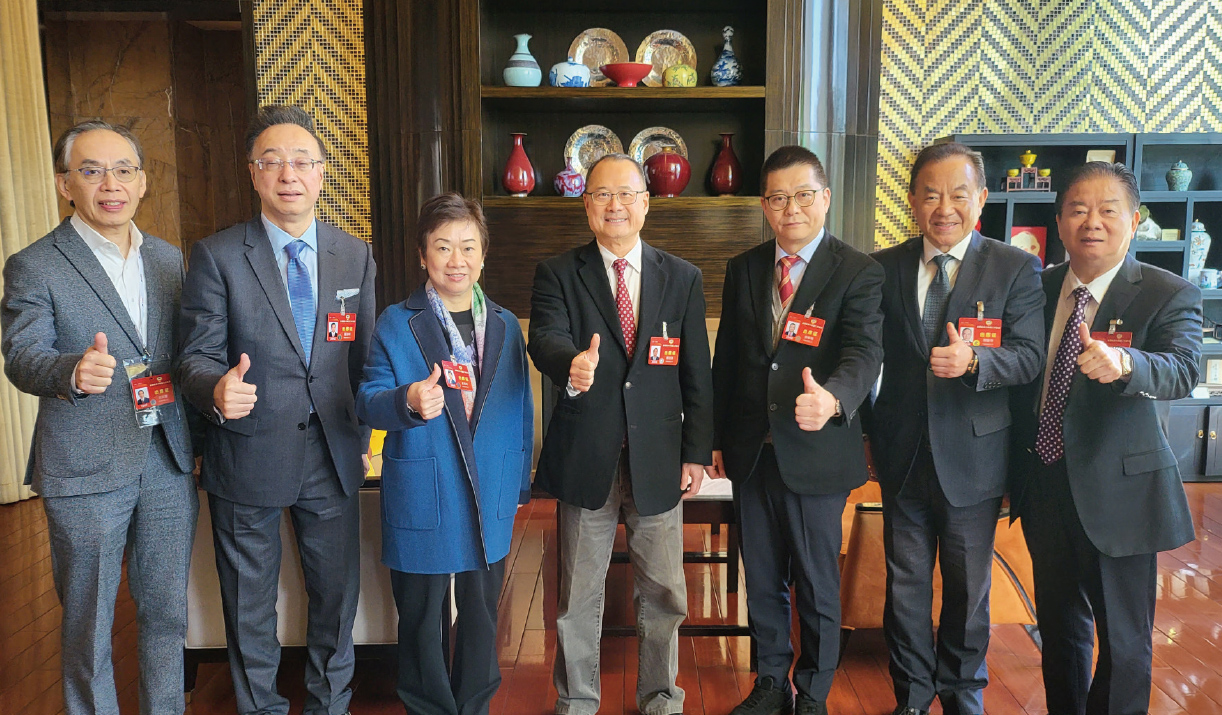

Jonathan Choi:
Country shows confidence and suggestions are based on collective wisdom
Ding Xuexiang, Member of the Standing Committee of the Political Bureau of the CPC Central Committee and Vice Premier of the State Council, met with NPC deputies and CPPCC members from Hong Kong and Macao for the first time since assuming leadership of the Central Leading Group on Hong Kong and Macao Affairs last year. Choi said that this is an expression of the country’s care for Hong Kong and Macau and full implementation of the “one country, two systems” policy.
Choi further said that Ding, who also highly affirmed Hong Kong’s achievements last year, showed his extensive familiarity with the various issues, reflecting his full understanding of Hong Kong’s situation.
Backed by the collective wisdom of the Chamber, Choi made a speech at the sessions where he suggested developing Hong Kong’s Northern Metropolis into a national-level future industrial pilot zone. On these new tracks, leverage Hong Kong’s unique advantages to make new contributions to the country’s higher-level opening-up and high-quality development.

Ricky Tsang:
Find ways to facilitate Hong Kong’s young people going north for education and development
Ricky Tsang, the Chamber’s Vice-Chairman and CPPCC National Committee Member, expressed his views on the integration of Hong Kong’s new generation into the Guangdong-Hong Kong-Macao Greater Bay Area (Greater Bay Area) at the “Two Sessions”. First, regarding Hong Kong’s young people going to the Greater Bay Area to start businesses or seek employment, Tsang suggested that the country should address the current issues and strengthen cooperation with the HKSAR Government. These include comprehensively improving the cross-border business and living environment in the Greater Bay Area and establishing a talent database and an innovative entrepreneurship support platform for Hong Kong’s young people developing in the Mainland. This is to enable a continuous trend of Hong Kong’s young people going north for development.
Regarding the issue of education and further education for Hong Kong children in the Greater Bay Area, he suggested that relevant national departments and the HKSAR Government could strengthen coordination and cooperation to establish Hong Kong-style public schools for Hong Kong children in the Greater Bay Area cities to resolve the issue quickly and completely.
In addition, in Tsang’s view, many Hong Kong civil servants lack a proper understanding of the country and act in a rigid manner. Therefore, he suggested that civil servants should strengthen training, including going to the Mainland to attend designated courses or even working there for a period of time to develop a macroscopic perspective.
Connie Wong:
Increase liquidity, ease restrictions and promote RMB internationalization
Hong Kong assisting RMB internationalization and promoting the country’s high-quality development are key issues. Connie Wong, the Chamber’s Vice-Chairman and CPPCC National Committee Standing Committee Member, submitted a proposal in this regard at this year’s “Two Sessions”.
Wong pointed out that the continued rise of the Hong Kong interbank offered rate, which is based on a linked exchange rate system, has an adverse impact on cash flow and debt solvency. Therefore, the country’s active promotion of RMB internationalization and strengthening of RMB liquidity are particularly important for Hong Kong businesses. In this regard, she suggested strengthening the liquidity of RMB in Hong Kong and requested the central bank to provide a stable supply of offshore RMB. Moreover, allow Hong Kong banks to obtain RMB funds of different maturities to support the demand for RMB loans of different maturities. She is confident that if this move is piloted in the Greater Bay Area, it can become a good opportunity for linking and integrating the financial markets in the area.
In addition, Wong suggested easing access restrictions on cross-border capital pools. She said that if the central bank relaxes the policy of incorporating the rental income of the self-operated commercial real estate sector into the capital pools, Hong Kong companies will be able to manage their domestic and overseas capital flows more efficiently and reduce the capital costs of Hong Kong member companies. She suggested that the country could consider establishing a guiding interest rate for the RMB and promote it on a wider scale to accelerate the RMB’s influence in international financial markets.
Herman Hu:
Tell good story of Hong Kong via sports, travel and overseas visits
Regarding this year’s “Two Sessions”, Herman Hu, the Chamber’s Vice-Chairman and NPC Deputy, particularly felt that Hong Kong is being cherished by the country. For example, Ding Xuexiang, Xia Baolong and Li Hongzhong attended the meetings of Hong Kong’s NPC deputies, during which they expressed their concerns for Hong Kong. Moreover, the government work report of the “Two Sessions”, which mentioned Hong Kong more than before, emphasised support for Hong Kong’s economic development and improvement of people’s livelihood.
Hu put forward several suggestions to repay the country’s support. He suggested that when leaders of the NPC go on overseas visits, they can invite representative Hong Kong’s NPC deputies to accompany them to personally share with overseas leaders the success in implementing “one country, two systems” in Hong Kong. Besides avoiding all kinds of smearing and slandering, this can also enhance friendly exchanges and communications with foreign countries.
In addition, Hu suggested that the country authorize Hong Kong to host the “Belt and Road” Games to promote exchanges between China and foreign countries in culture and soft power. He also suggested to continue expanding the scope of independent travel to other developed cities far away from Hong Kong, and to deepen people’s people-to-people contacts.
Li Yinquan:
Hong Kong’s financial advantages remain intact and strengthen contribution to country
During the “Two Sessions”, Li Yinquan, the Chamber’s Vice-Chairman and NPC Deputy, expressed his high level of concern about Hong Kong’s international financial centre status, offshore RMB business and boosting business confidence in Hong Kong. He pointed out that Hong Kong’s status as an international financial centre will not be weakened as it is supported by solid economic and legal conditions and the country’s backing.
To the country, Hong Kong, which is a mature and highly efficient international financial centre, plays an irreplaceable role. Specifically, Li suggested setting up a representative office of the People’s Bank of China in Hong Kong to be responsible for the injection and withdrawal of offshore RMB, and establishing an offshore RMB clearing centre there. This will enable all issued offshore RMB to be outside the country, while the clearing centre will be within the scope of the country’s management. Regarding how to boost business confidence, Li suggested enhancing market regulations, regulatory service efficiency and economic freedom to consolidate the foundation.
Andrew Yao:
Hope Hong Kong will develop into country’s hub for higher education
Andrew Yao, the Chamber’s Vice Chairman and NPC Deputy, has prepared five suggestions for this year’s “Two Sessions”. These include promoting Hong Kong to become an international hub for tertiary education, facilitating talent interaction and exchanges within the Greater Bay Area, enhancing the functions of the ports in the Greater Bay Area, promoting tourism development in the Mainland and Hong Kong, and enhancing the competitiveness of Hong Kong’s ports.
The government work report of this year’s “Two Sessions” specifically mentioned the need to expedite the development of world-class universities and strong disciplines with Chinese features, stressing the importance of rejuvenating the nation through science and education and the development of higher education. In Yao’s view, this has great foresight and strategic significance. He said that Hong Kong, which has clear advantages in education innovation and talent innovation, can actively develop into the country’s hub for higher education.
Hong Kong was working on the legislation for Article 23 of the Basic Law while the “Two Sessions” were taking place. The central leaders expressed the Central Government’s concerns about Hong Kong. Yao believes that with sound legal system measures, Hong Kong will be able to safeguard national security and protect the legitimate rights of its people.

David Fong:
Grasp “new quality productive forces” development trend
David Fong, the Chamber’s Life Honorary Chairman and CPPCC National Committee Member, was deeply impressed by his meeting with Vice Premier Ding. The Central Government will make every effort to maintain Hong Kong’s social prosperity and stability as it regards Hong Kong as its crown jewel. As such, the Central Government hoped for an early enactment of Article 23 so that Hong Kong can move forward without any burdens and help the country open-up at a high level. In Fong’s view, Ding has a full understanding of Hong Kong and Macao affairs and is an excellent leader.
Fong also said that “new quality productive forces”, which was mentioned in the government work report for the first time this year, ranked first among the top ten priorities this year. It is the key to China reshaping its new advantages in global competition. President Xi Jinping stressed the need to develop new quality productive forces, adopt forward-thinking plans for developing future-oriented industries, transform and upgrade traditional industries with new technologies, and take rigorous actions to make industries higher-end, smarter and more environmentally friendly.
In Fong’s view, Hong Kong needs to develop in step with the country, grasp the development trend of “new quality productive forces”, closely connect with the Mainland and the wider world, create an internationally competitive innovative industry cluster, and contribute to strengthening the country’s comprehensive national strength and international status.
Tommy Li:
Promote TCM and contribute to Healthy China strategy
In the view of Tommy Li, the Chamber’s Life Honorary Chairman and NPC Deputy, the high-quality development of traditional Chinese medicine (TCM) is an important resource for the “Healthy China” strategy. He mainly made two suggestions, including jointly planning the Blueprint for the Development of TCM in the Greater Bay Area (2025-2030) and holding the “Greater Bay Area TCM Health Festival”.
He said that the cities in the Greater Bay Area are interconnected with one another and each has its own advantages. Hong Kong, which is a meeting point of Chinese and Western medicines, not only has a Chinese medicine testing institute that meets international standards, but is also establishing a Hong Kong Chinese materia medica standards library. Therefore, through the formulation of the Blueprint, the various places can enhance cooperation and complementarity as well as share achievements. The main contents may include TCM services, coordinated industrial development, and TCM academic professional development.
The Greater Bay Area TCM Health Festival can also be spearheaded by the governments of the three places to hold events such as large-scale roving TCM exhibitions and in-depth guided tours on TCM culture, with the aim of comprehensively enhancing the public’s understanding of TCM. He firmly believes that the joint promotion of TCM by the cities in the Greater Bay Area will lead to better results for the high-quality development of the Healthy China strategy.
Rock Chen:
“Two Sessions” workflow now more efficient and Hong Kong has country’s attention
Rock Chen, the Chamber’s Life Honorary Chairman and NPC Deputy, said that the workflow of this year’s “Two Sessions” was particularly compact and fulfilling. He also mentioned that the government work report included special care for Hong Kong, including continuing to implement the “one country, two systems” policy and supporting Hong Kong’s economic development and improvement of people’s livelihood, which made him feel our country’s support and attention to Hong Kong.
Chen submitted several major suggestions to positively respond to the country’s support for Hong Kong. One of them is to improve exchange-traded fund (ETF) interconnection so that more of Hong Kong’s ETFs can participate in ETF interconnectivity. Another one is to include real estate investment trusts (REITs) in the investment objectives of the Stock Connect mechanism so that publicly offered REITs products in the Mainland and Hong Kong can become more diversified financing tools. Furthermore, he suggested expanding the capacity and quantity of the securities eligible for trading under the HKD-RMB Dual Counter Model, increasing the number of “dual counter” securities and encouraging more listed companies to issue RMB-denominated shares. He looks forward to Hong Kong continuing to leverage its unique advantages to cooperate with the country’s efforts to develop into a financial power and grab the opportunities in it.
Martin Liao:
Hong Kong helps country’s international philanthropy
Martin Liao, the Chamber’s Standing Committee Member and the LegCo Representative and CPPCC National Committee Standing Committee Member, revealed that he submitted three personal proposals and six joint proposals at this year’s “Two Sessions”. Among them, his personal proposal on “leveraging Hong Kong’s international charity platform to strengthen the country’s charity undertakings” has been selected as an outstanding proposal.
He explained that the country attaches great importance to charity undertakings. Hong Kong, which is Asia’s hub for charity, has abundant charity resources to assist the country. Therefore, he suggested that the Mainland and Hong Kong can work together to leverage the international exchange platform for philanthropy to help the country’s charity organisations obtain more resources and improve their management level and professional capabilities. At the same time, Hong Kong can provide a convenient platform for the country’s charity organisations to participate in international charity events and summits to strengthen the country’s voice and influence in international philanthropy.
Furthermore, this year’s work report put the development of “new quality productive forces” at the top of the agenda. Liao believes that Hong Kong should grab this opportunity. He said that Hong Kong’s strong basic scientific research capabilities can enable it to help the country break new grounds in key technological fields. The orderly advancement of various emerging industries such as microelectronics can lead the way for the sustainable development of “new quality productive forces”. He believes that the in-depth integration of the Greater Bay Area will expedite the transformation of scientific research achievements and contribute to the country’s development of “new quality productive forces”.




